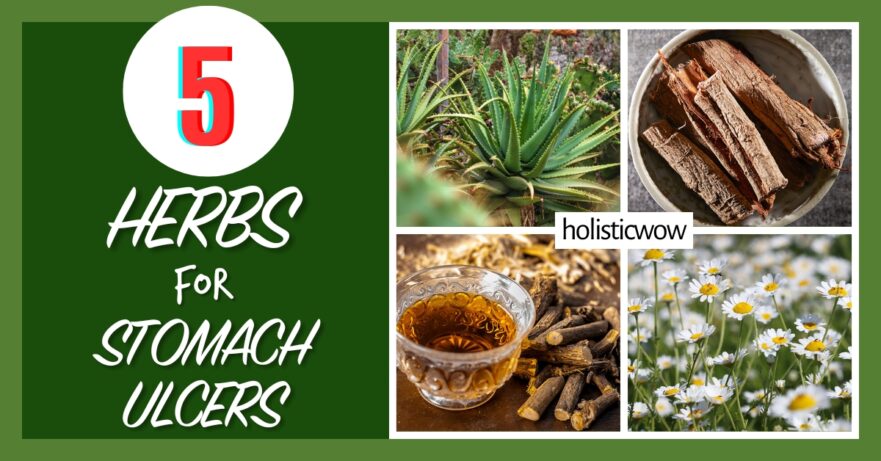In this article about herbs for ulcers:
🌿 Best Herbs for Ulcers | 📜 Herbal Preparations and Recipes for Peptic Ulcers | ☯️ Integrating Herbs into Daily Life for Ulcer Relief | 🌱 Navigating Herbs Safely
Peptic ulcers are open sores that develop on the lining of the stomach or small intestine. They cause burning pain, nausea, and bloating, significantly impacting daily life. If left untreated, ulcers can lead to serious complications like internal bleeding.
Certain herbs offer natural relief for ulcer symptoms and support healing. Licorice, turmeric, and aloe vera have shown promise in protecting the stomach lining and reducing inflammation. These plant-based remedies can complement conventional treatments for ulcers.
This article explores five key herbs for ulcer care, their potential benefits, and how to use them safely. Understanding these natural options can help you make informed decisions about managing your digestive health.
Key Takeaways
- 🌿 Potent Herbal Remedies: Licorice, turmeric, and aloe vera show strong potential in protecting the stomach lining and reducing inflammation associated with peptic ulcers.
- 🍵 Soothing Tea Blends: Herbal tea combinations using chamomile, slippery elm, and licorice can provide daily relief and support ulcer healing.
- ✨ Natural Protective Agents: Certain herbs like slippery elm and aloe vera form a protective coating in the digestive tract, helping to soothe irritated tissues.
- 🌼 Stress-Reducing Herbs: Chamomile and other calming herbs may help manage stress, a factor that can exacerbate ulcer symptoms.
- 💖 Holistic Approach Needed: Combining herbal remedies with dietary changes and stress management techniques offers a comprehensive strategy for managing peptic ulcers.
🌿 Best Herbs for Ulcers
Peptic ulcers are open sores that develop on the inner lining of the stomach and upper small intestine. These painful lesions can cause significant discomfort and interfere with daily life. Common symptoms include burning stomach pain, feelings of fullness, bloating, and intolerance to fatty foods. In some cases, ulcers may lead to more serious complications like internal bleeding.
The main causes of peptic ulcers are Helicobacter pylori (H. pylori) bacterial infection and long-term use of nonsteroidal anti-inflammatory drugs (NSAIDs). Stress and spicy foods don’t cause ulcers but may exacerbate symptoms in some individuals. Other factors that can increase ulcer risk include smoking, alcohol consumption, and a family history of ulcers.
Several herbs have been traditionally used to support ulcer healing and provide symptom relief. These include licorice (Glycyrrhiza glabra), turmeric (Curcuma longa), aloe vera (Aloe barbadensis), slippery elm (Ulmus rubra), and chamomile (Matricaria recutita). These plants contain bioactive compounds that may protect the stomach lining, reduce inflammation, and aid the healing process of ulcerated tissue. However, while herbal remedies show potential, using them alongside conventional treatments under medical supervision is crucial to ensure safety and efficacy.
Ashwagandha (Withania somnifera)
Licorice (Glycyrrhiza glabra) has been shown to have multiple benefits for managing peptic ulcers. It contains bioactive flavonoids with antimicrobial activity against Helicobacter pylori, including strains resistant to common antibiotics. Additionally, aqueous extracts of licorice prevent H. pylori from adhering to the stomach lining, which may reduce bacterial colonization and enhance ulcer protection. Clinical research has demonstrated that licorice extracts can improve ulcer healing and reduce H. pylori colonization when used alongside conventional treatments. However, long-term or excessive use of licorice can lead to high blood pressure, fluid retention, and low potassium levels due to its impact on hormone balance. These effects highlight the importance of medical supervision, particularly for individuals with heart or kidney conditions.
Chasteberry (Vitex agnus-castus)
Turmeric (Curcuma longa) has been a cornerstone of Ayurvedic medicine for centuries and is valued for its digestive and anti-inflammatory benefits. Its active compound, curcumin, is a potent antioxidant and anti-inflammatory agent that has shown promise in supporting peptic ulcer treatment. Research indicates that curcumin may help manage peptic ulcers by inhibiting the growth of Helicobacter pylori, a key factor in ulcer formation. Curcumin’s anti-inflammatory effects can help alleviate inflammation in the stomach lining, improving ulcer symptoms like dyspepsia. While curcumin alone may not enhance H. pylori eradication, clinical studies have shown it to be a useful adjunct to standard therapy, significantly improving dyspepsia symptoms without additional side effects.
Dong quai (Angelica sinensis)
Aloe vera (Aloe barbadensis), commonly known for its skin-soothing effects, also provides digestive benefits. Its gel contains bioactive compounds that help reduce inflammation and support healing in the digestive tract. Research suggests aloe vera may aid peptic ulcer management primarily through its antimicrobial properties, which are effective against H. pylori, a key cause of ulcers. Aloe vera gel shows promise as a natural agent to complement antibiotic treatments, especially against antibiotic-resistant H. pylori strains. It also helps protect the stomach lining and reduce inflammation, possibly relieving ulcer symptoms. Aloe works by lowering harmful inflammation-related substances and reducing immune cell activity in the stomach, strengthening its defenses against damage (Prabjone et al., 2006).
Red clover (Trifolium pratense)
Slippery elm (Ulmus rubra) has been used in Native American medicine for centuries to manage digestive issues. Its bark contains mucilage, a gel-like substance that coats and protects the stomach and intestinal lining, making it helpful for conditions like peptic ulcers. Research suggests slippery elm may help shield the stomach lining from excess acid and promote the healing of damaged tissues. It also has mild anti-inflammatory properties that can reduce inflammation in the digestive tract. Preliminary studies suggest slippery elm has potent gastroprotective effects, significantly reducing ulcer severity and shielding the stomach lining from irritants like ethanol. Its effectiveness was comparable to standard medications like esomeprazole in experimental models. Further clinical trials are needed to confirm these benefits in humans.
Maca (Lepidium meyenii)
Chamomile (Matricaria recutita) has been used for centuries in traditional medicine, particularly for its calming and soothing effects. It offers potential benefits for digestive health, with anti-inflammatory and antispasmodic properties that may help manage peptic ulcers. Chamomile could reduce stomach acid and alleviate pain associated with ulcers, while its mild sedative effects may lower stress, a factor that can worsen ulcer symptoms. Research suggests chamomile has antimicrobial properties, including activity against Helicobacter pylori. In experimental models, chamomile extracts demonstrated significant ulcer-protective effects, effectively reducing gastric lesions caused by irritants.
📜 Herbal Preparations and Recipes for Peptic Ulcers
To support digestive health and address peptic ulcers, we’ve developed specific herbal tea and tincture recipes incorporating herbs known for their soothing and anti-inflammatory properties. These blends are intended to help calm the stomach lining, potentially reduce mild inflammation, and support healing. However, these should complement, not replace, medical treatment.
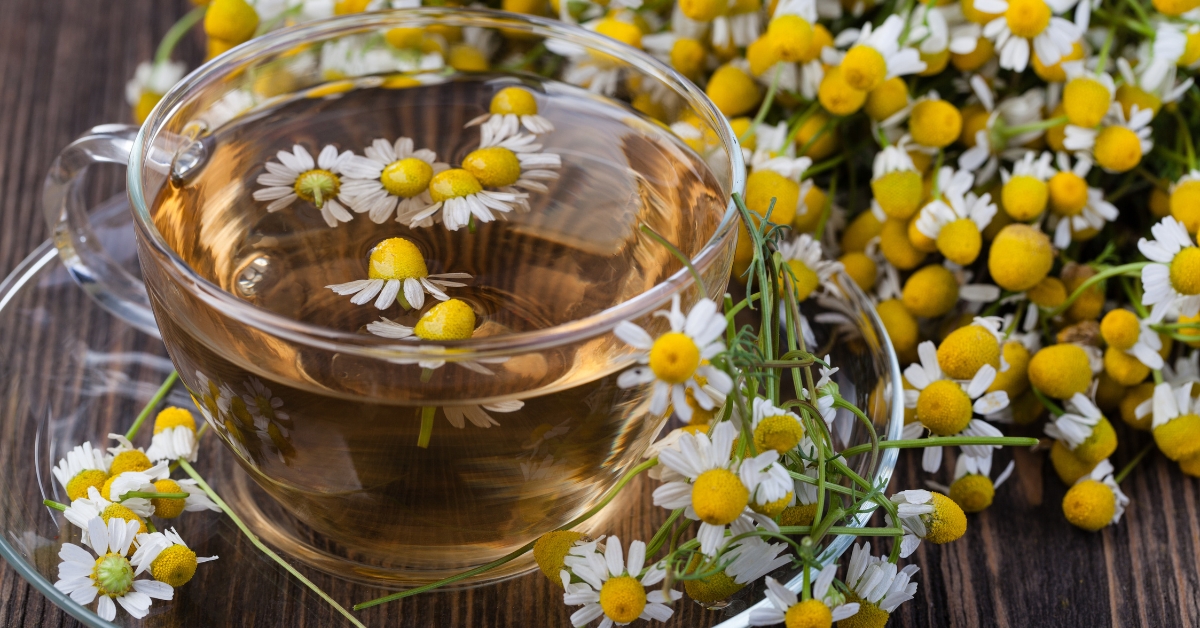
Soothing Stomach Tea
Ingredients:
- 1 teaspoon dried chamomile flowers
- 1 teaspoon dried slippery elm bark
- 1 cup of boiling water
Preparation:
- Combine the dried herbs in a teapot.
- Add 1 cup of boiling water and steep for 10-15 minutes.
- Strain and drink once daily, preferably before bedtime, to help soothe the stomach.
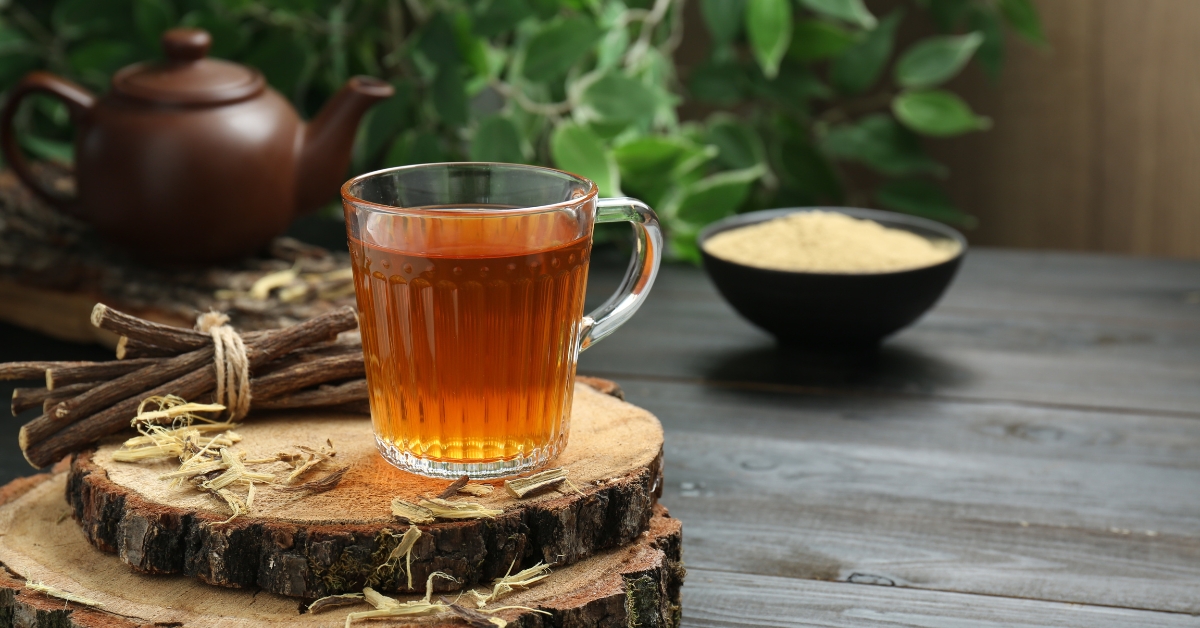
Ulcer Relief Blend
Ingredients:
- 1 teaspoon dried chamomile flowers
- ¾ teaspoon dried slippery elm bark
- ½ teaspoon dried licorice root
- 1 cup of boiling water
Preparation:
- Mix the herbs in a teapot.
- Pour boiling water over the herbs and steep for about 10 minutes.
- Strain and drink twice daily, morning and evening, to help manage discomfort associated with ulcers.
Note: Licorice root may cause side effects like high blood pressure if used in high doses or long-term; consult a healthcare provider before use, especially if you have existing health conditions.
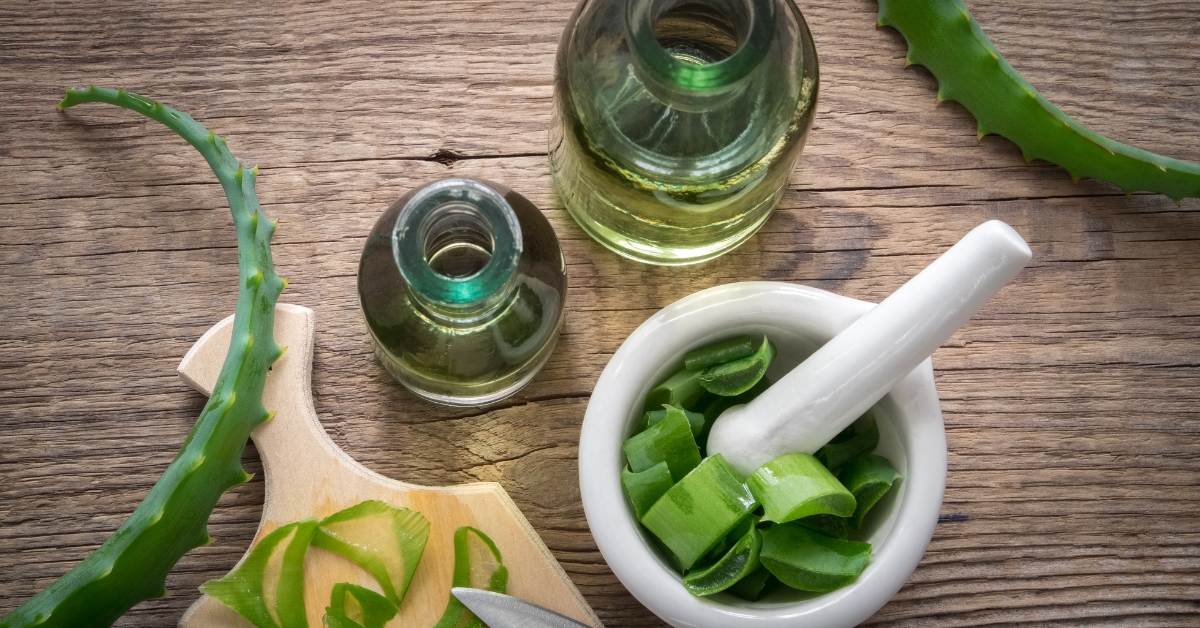
Aloe Vera Mixture (Using Commercial Gel)
Ingredients:
- 2 tablespoons (30 ml) commercially prepared aloe vera gel, labeled for internal use
- ½ cup (120 ml) water
Preparation:
- Mix 2 tablespoons of aloe vera gel with ½ cup of water in a clean container.
- Store the mixture in the refrigerator and shake well before each use.
- Divide the mixture into three portions and consume one portion (approximately 2-3 tablespoons) before each meal.
Note: Always follow the dosage instructions on your aloe vera gel product. If the label specifies a different dose for internal use, adjust accordingly. Discard any unused mixture after 7 days to ensure freshness and safety.
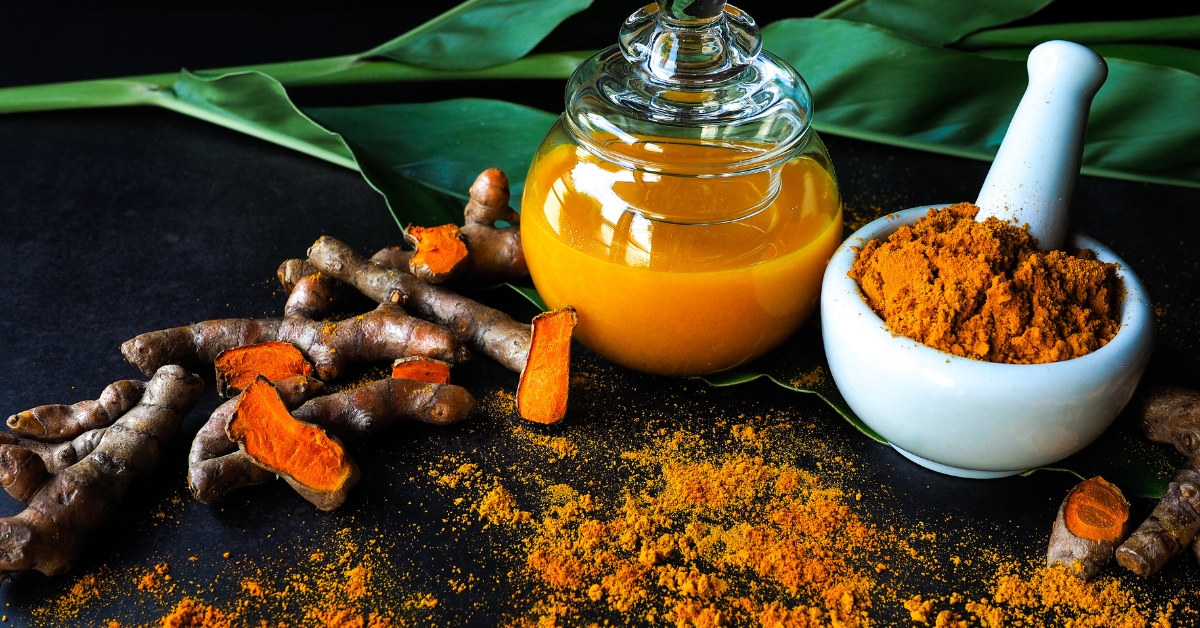
Turmeric-Licorice Tincture
Ingredients:
- 2 teaspoons dried turmeric root
- 1 teaspoon dried licorice root
- 1 teaspoon dried chamomile flowers
- 2 ounces of vodka or brandy
Preparation:
- Combine all dried herbs in a small jar.
- Cover with alcohol and let sit for 2-4 weeks, shaking daily.
- Strain and take 1/4 teaspoon in water three times daily before meals.
Note: Licorice root may cause side effects like high blood pressure if used in high doses or long-term; consult a healthcare provider before use, especially if you have existing health conditions.
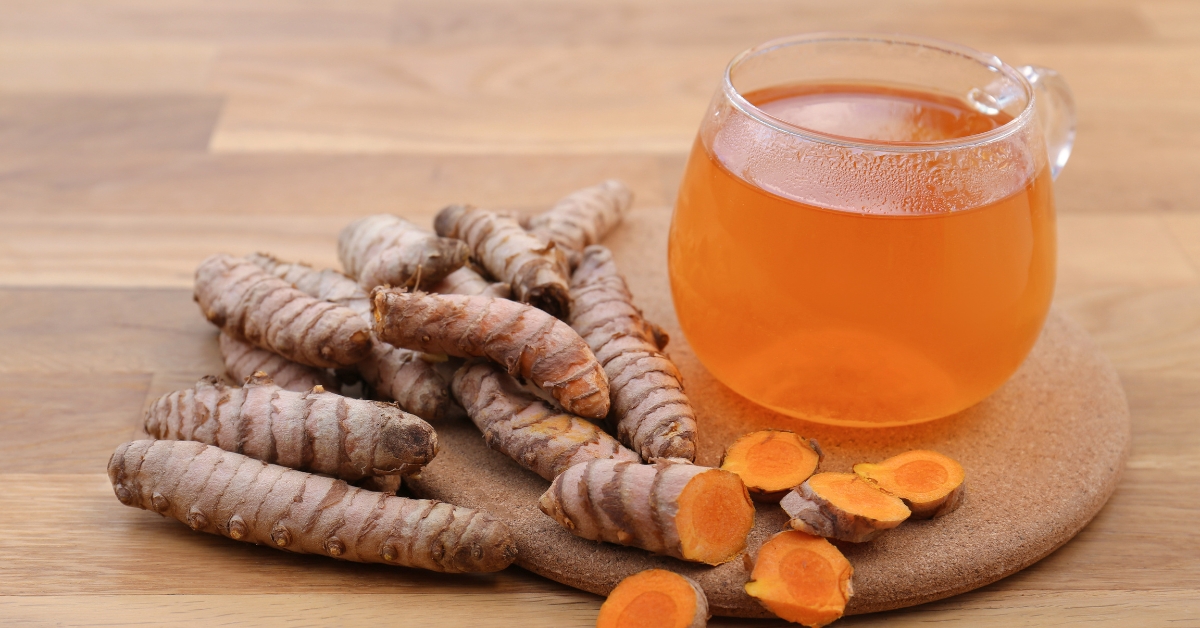
Anti-Inflammatory Ulcer Support
Ingredients:
- 1 teaspoon dried turmeric root
- 1 teaspoon dried chamomile flowers
- ½ teaspoon dried licorice root
- ½ teaspoon dried slippery elm bark
- 1 cup of boiling water
Preparation:
- Place all dried herbs in a teapot, add boiling water, and steep for 15 minutes.
- Strain and drink once daily in the morning to help support comfort and mild inflammation management.
Note: Licorice root may cause side effects like high blood pressure if used in high doses or long-term; consult a healthcare provider before use, especially if you have existing health conditions.
These herbal blends are designed for easy integration into daily routines. Always consult a healthcare provider before starting any herbal regimen, particularly if you are on medications like blood thinners or have pre-existing health conditions.
☯️ Integrating Herbs into Daily Life for Ulcer Relief
Incorporating herbs into your daily routine can support ulcer management and digestive health. Here are practical tips for using herbs effectively and complementary practices to maximize their benefits.
Daily Use and Lifestyle Integration
- ☀️ Morning Ritual: Start your day with a cup of Soothing Stomach Tea. This morning ritual can help protect your stomach lining and may support gastric comfort.
- 💧 Pre-Meal Tincture: Consider taking the Turmeric-Aloe Tincture before meals to help manage inflammation and support healing. Turmeric has potential anti-inflammatory benefits, while aloe vera may help soothe the digestive tract.
- 🫖 Daytime Support: Sip on the Ulcer Relief Blend throughout the day for ongoing support. You can prepare a larger batch and store it in a thermos to drink regularly.
- 💚 Evening Relaxation: Before bed, enjoy a cup of chamomile tea to calm your digestive system and promote relaxation, which may support healing. Chamomile has been associated with digestive soothing effects, including potential ulcer relief.
Additional Practices to Support Ulcer Healing
- 🥬 Dietary Adjustments: Focus on foods that are gentle on the stomach and rich in healing nutrients. Include cabbage, which contains compounds that may help protect the stomach lining. Cabbage juice has shown the potential to support ulcer recovery. Avoid foods that exacerbate symptoms, such as spicy or highly acidic items.
- 🧘♀️ Stress Management: Incorporate stress-reducing practices like deep breathing, meditation, or gentle yoga. Chronic stress may affect digestive function and potentially slow ulcer recovery, so managing it is crucial for healing.
- 🏃♀️ Regular Exercise: Engage in moderate activities like walking or swimming to improve overall health and digestive function. Avoid high-intensity exercises, as they could increase stomach discomfort or acid production.
- 🕒 Meal Timing: Eat smaller, more frequent meals to avoid overburdening your digestive system. This strategy may help minimize acid production and manage ulcer symptoms.
Integrating these herbal remedies and supportive practices into your daily life can create a comprehensive approach to managing peptic ulcers. Start with small doses of herbs to gauge your body’s response. If symptoms worsen or new digestive issues arise, discontinue use and consult your healthcare provider.
🌱 Navigating Herbs Safely
Starting with small doses is the first step when adding herbal remedies to your health routine. This approach lets you see how you respond and adjust amounts for the best effect, keeping safety in mind. While many herbs are safe, everyone’s body reacts differently. If you notice any side effects, it’s important to stop and think about what might be causing them.
Remember, herbs can sometimes interact with prescription medicines. These interactions might make your medicines work too well or not well enough, so talking to a healthcare provider or an herbalist is essential. This is especially crucial if you’re pregnant, breastfeeding, taking medications regularly, or have an existing health condition. Getting advice tailored to your situation can help you avoid any unnecessary risks.
For kids and older adults, being extra careful with herbs is important. Their bodies might react more strongly to herbal remedies, and the chance of side effects or interactions could be greater. Before giving herbal treatments to children or elderly family members, getting advice from a professional is a must to ensure their safety.
By being cautious and seeking expert advice when needed, you can make herbal remedies a safe part of your wellness plan. This careful approach allows you to enjoy the benefits of herbs while keeping yourself and your family safe.
We explored herbal remedies for peptic ulcers, focusing on five key herbs: licorice, turmeric, aloe vera, slippery elm, and chamomile. These plants have been used traditionally and are supported by modern research for their potential to protect the stomach lining, reduce inflammation, and promote the healing of damaged tissue.
There are several herbal preparations, including teas, tinctures, and infusions. These recipes combine multiple herbs to create comprehensive ulcer care blends. We also offered practical tips for incorporating these remedies into daily life, such as starting the day with a soothing tea and taking tinctures before meals.
In addition to herbal treatments, we recommend complementary practices like dietary adjustments, stress management, regular exercise, and proper meal timing to support ulcer healing. It’s important to have a holistic approach to managing peptic ulcers, combining herbal remedies with lifestyle changes for optimal results.
Start with small doses of herbs and consult a healthcare provider before beginning any new herbal regimen, especially when taking medications.
FAQ
What are the most effective herbs for treating peptic ulcers?
Several herbs may support peptic ulcer management due to their protective, anti-inflammatory, and healing properties. Licorice (Glycyrrhiza glabra) is one of the most studied herbs for ulcers. It contains bioactive compounds that may increase mucus production and reduce Helicobacter pylori colonization, providing a protective barrier against acid. Deglycyrrhizinated licorice (DGL) is preferred to avoid side effects such as high blood pressure and low potassium. Turmeric (Curcuma longa) has strong anti-inflammatory properties that may help reduce stomach inflammation and support healing. However, high doses should be used cautiously as they may irritate the stomach in sensitive individuals. Aloe vera (Aloe barbadensis) has soothing properties that may coat the stomach lining, help reduce acid levels, and provide antimicrobial activity against H. pylori. Slippery elm (Ulmus rubra) forms a protective gel when mixed with water, which can coat and soothe the digestive tract. Chamomile (Matricaria recutita) offers anti-inflammatory and antispasmodic effects that may relieve ulcer-related discomfort and have potential antimicrobial activity against H. pylori. While these herbs are promising, it’s crucial to consult a healthcare provider before using them, especially if you’re taking other medications or have existing health conditions.
How do I use herbs safely to treat peptic ulcers?
Using herbs safely for peptic ulcers requires several precautions. First, obtain a proper diagnosis from a healthcare provider to ensure you're addressing a peptic ulcer and not another condition. Once confirmed, begin with small doses of herbs to monitor your body’s response. Licorice and turmeric can be taken as teas or supplements, but licorice should be DGL to minimize risks like high blood pressure. Aloe vera juice should only be used if labeled safe for internal consumption, as some forms may not be appropriate for ingestion. Slippery elm is typically consumed as a powder mixed with water or in tea form, while chamomile is most commonly taken as a tea. Be consistent with herbal treatments, as they may take time to show results. Always inform your doctor about any herbs you use, as they can interact with medications. If symptoms worsen or fail to improve after a few weeks, seek medical attention.
Can herbal remedies completely cure peptic ulcers?
While herbal remedies can effectively manage symptoms and support the healing of peptic ulcers, they are unlikely to cure the condition completely on their own. Peptic ulcers often require a comprehensive treatment approach. Herbs like licorice, turmeric, aloe vera, slippery elm, and chamomile can help reduce inflammation, protect the stomach lining, and promote healing. However, antibiotic therapy is essential if Helicobacter pylori infection is the cause. Likewise, if NSAIDs are contributing to the ulcer, stopping or adjusting the medication is necessary. Herbal remedies can be a valuable part of a holistic plan, including dietary changes, stress management, and lifestyle modifications. They may accelerate healing, alleviate symptoms, and help prevent recurrence. Work closely with a healthcare provider to develop a tailored treatment plan that addresses the root cause of your ulcer while incorporating herbal support.

